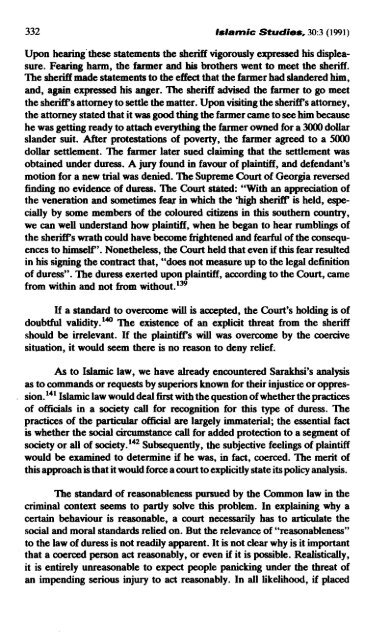LAW OF DURESS IN ISLAMIC LAW AND COMMON LAW: A ...
LAW OF DURESS IN ISLAMIC LAW AND COMMON LAW: A ...
LAW OF DURESS IN ISLAMIC LAW AND COMMON LAW: A ...
You also want an ePaper? Increase the reach of your titles
YUMPU automatically turns print PDFs into web optimized ePapers that Google loves.
332 klamic Studies, 30:3 (1991)<br />
Upon hearing these statements the sheriff vigorously expressed his displeasure.<br />
Fearing harm, the h e r and his brothers went to meet the sheriff.<br />
The sheriff made statements to the effect that the farmer had slandered him,<br />
and, again expressed his anger. 'Ihe sheriff advised the farmer to go meet<br />
the sheriff's attorney to settle the matter. Upon visiting the sheriff's attorney,<br />
the attorney stated that it was good thing the farmer came to see him because<br />
he was getting ready to attach everything the farmer owned for a 3000 dollar<br />
slander suit. After protestations of poverty, the farmer agreed to a 5000<br />
dollar settlement. The farmer later sued claiming that the settlement was<br />
obtained under duress. A jury found in favour of plaintiff, and defendant's<br />
motion for a new trial was denied. 'Ihe Supreme Court of Georgia reversed<br />
finding no evidence of duress. 'Ihe Court stated: "With an appreciation of<br />
the veneration and sometimes fear in which the 'high sherifP is held, especially<br />
by some members of the coloured citizens in this southern country,<br />
we can well understand how plaintiff, when he began to hear rumblings of<br />
the sheriff's wrath could have become frightened and fearful of the comequences<br />
to himself'. Nonetheless, the Court held that even if this fear resulted<br />
in his signing the contract that, "does not measure up to the legal definition<br />
of duress". The duress exerted upon plaintiff, according to the Court, came<br />
from within and not from with0~t.l~~<br />
If a standard to overcome will is accepted, the Court's holding is of<br />
doubtful validity.14' 'Ihe existence of an explicit threat from the sheriff<br />
should be irrelevant. If the plainti£f's will was overcome by the coercive<br />
situation, it would seem there is no reason to deny relief.<br />
As to Islamic law, we have already encountered Sarakhsi's analysis<br />
as to commands or requests by superiors known for their injustice or oppres-<br />
sion.14' Islamic law would deal first with the question of whether the practices<br />
of officials in a society call for recognition for this type of duress. The<br />
practices of the particular official are largely immaterial; the essential fact<br />
is whether the social circumstance call for added protection to a segment of<br />
society or all of society.142 Subsequently, the subjective feelings of plaintiff<br />
would be examined to determine if he was, in fact, coerced. The merit of<br />
this approach is that it would force a court to explicitly state its policy analysis.<br />
'Ihe standard of reasonableness pursued by the Common law in the<br />
criminal context seems to partly solve this problem. In explaining why a<br />
certain behaviour is reasonable, a court necessarily has to articulate the<br />
social and moral standards relied on. But the relevance of "reasonableness"<br />
to the law of duress is not readily apparent. It is not clear why is it important<br />
that a coerced person act reasonably, or even if it is possible. Realistically,<br />
it is entirely unreasonable to expect people panicking under the threat of<br />
an impending serious injury to act reasonably. In all likelihood, if placed
















